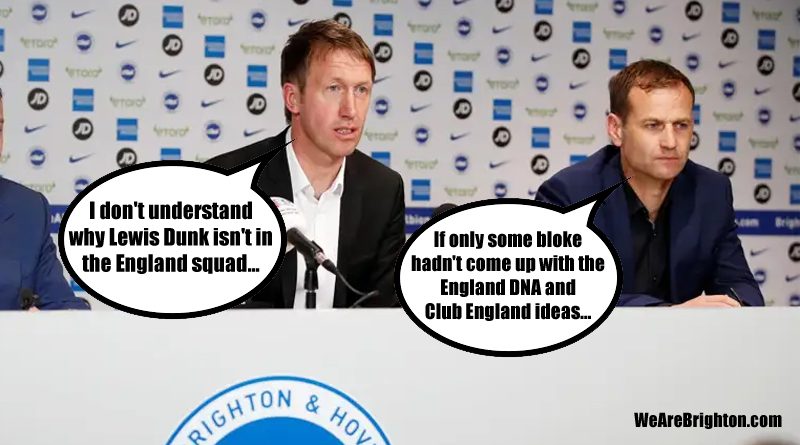Ashworth, England DNA and left feet: Why Dunk isn’t in the England squad
Why isn’t Lewis Dunk in the England squad? It’s a question that rears its head every time an international break rolls around, especially when the Three Lions are conceding three goals at home to Kosovo or losing their first qualifier for 10 years away in the Czech Republic.
The hysteria reached fever pitch after that 2-1 defeat in Prague on Friday night. Twitter in particular was full of it with people not just wondering why Dunk wasn’t there, but Dan Burn and Adam Webster too.
There was even one suggestion that Graham Potter could be the next England manager – after two Premier League wins in his career.
The 3-0 victory over a desperately poor Tottenham Hotspur side seems to have made some Albion fans think we’re a natural breeding ground for the England manager to pick international class players from, rather than a club who’s won a grand total of four league games in 10 months.
Plainly, it’s nonsense. Less madcap than Potter managing or Burn playing for England is the issue of Dunk being recalled. For those not looking at it with extreme Brighton-bias however, there are several reasons as to why he hasn’t been involved in Gareth Southgate’s squad for the best part of a year.
Take off the blue-and-white-tinted spectacles and those reasons become clear – and none of them have anything to do with a Crystal Palace bias either, as some Albion supporters hilariously love to claim.
In fact, if you want to blame anyone for Dunk not getting another opportunity in an England shirt, you should turn your ire on Brighton’s current Technical Director Dan Ashworth rather than Southgate.
Ashworth was the man who came up with the extraordinarily successful England DNA concept. During his time at the FA, he decided that one of the most glaringly obvious ways to improve the fortunes of the national side would be to have every England side from youth teams through to senior playing in one set style.
That would ease the transition from Under 19s to Under 21s to full squad, at the same time as creating a core of technically gifted players coming through the system at St George’s Park who have all been drilled the same way.
Because Dunk hasn’t come through that system – save for two call ups but zero caps for the Under 21s in late 2011, before the concept of England DNA even existed – he’s less appealing to Southgate than a Fikayo Tomori who has learnt the ropes in the ranks.
As such, this pathway heavily favours promoting players from England’s successful youth sides who could be international regulars for the next decade, rather than parachuting in a 27-year-old from Brighton for a couple of years.
Ashworth aped this idea from Germany. Between Euro 2008 and the 2010 World Cup, Jogi Loew oversaw a massive turnover of players as he chucked in many of Die Manschafft’s Under 21 squad who won the European Championships against England in 2009.
Ahead of that World Cup in South Africa, the likes of Manuel Neuer, Mats Hummels, Sami Khedira, and Mesut Özil were all promoted to the senior squad.
It was a bold move, but it paid off in the long term – after reaching the semi finals in 2010 and at the Euros in Poland and Ukraine in 2012, Germany’s players arrived in Brazil in 2014 at the peak of their powers and with a hugely experienced side.
The result? They became the first European nation to win a World Cup in South America, delivering one of the most astonishing performances in football history in the last four when they demolished the hosts 7-1.
At no point in that process did Loew turn to a 27-year-old defender from the equivalent of Mainz. That’s the reality of Dunk’s situation and it’s unfortunate for him to be at the peak of his powers now; had he been three or four years younger and had come through the England system, his chances of international recognition would be much higher.
This approach is however good news though for the likes of Haydon Roberts and Max Sanders, who are embedded in England’s age group sides – presuming of course the FA don’t tear up the England DNA blueprint before those two get their chance to establish themselves in the Albion first team and then in time perhaps, the England squad.
It’s this desire for familiarity that also keeps the likes of Michael Keane in the squad. Keane made a terrible mistake to gift Kosovo their opener at St Mary’s in September and didn’t exactly cover himself in glory against Czech Republic.
He does however have 10 caps over the course of the past two years. He also played 16 times at Under 21 level before that and is a year younger than Dunk.
By wanting to turn England into something resembling a club side rather than an international one – Club England was another of Ashworth’s ideas when at the FA – Southgate is willing to give individuals several chances before jettisoning them, as a club manager would.
Keane has however seemingly used up all his lives. He was replaced against Bulgaria on Monday night by Tyrone Mings, which brings us nicely onto the Aston Villa defender who made his debut in Sofia, a decision that has angered lots of Albion fans.
But anyone who continues to be baffled or enraged by Mings’ elevation quite clearly hasn’t listened to the way that Southgate wants to set his defence up.
Almost since his first day in the job, Southgate has stated his preference for a right-foot, left-foot centre back combination.
England have a complete dearth of left footed centre backs, which is where Mings come in. He was a vital component in helping Aston Villa to promotion last season and has made a solid if unspectacular start to life in the Premier League.
His real value to Southgate though is that he is left footed. If Dunk was a naturally left footed player, then you could put your mortgage on him being a regular in the England squad.
There’s one other question mark against Dunk’s name which precludes his involvement at the minute, although we’re very hopeful it will be rubbed away by the end of this season with Graham Potter at the helm.
Dunk has played 83 games in the Premier League, but only eight of them have been as the sort of ball playing centre back that Southgate wants in this England squad.
Under Chris Hughton, Dunk was part of a back four that was asked to sit deep and head, block and tackle anything that came its way. As we all know, Dunk excelled at this and while those are important qualities for a defender to have, Southgate wants more.
It’s only under Potter that Dunk is truly getting the chance to showcase his ability at passing out from the back. Brighton fans know he’s bloody good at it, as his assists for Neal Maupay’s goal at Watford and Aaron Connolly’s second against Spurs prove.
If he can sustain that form and that quality as a ball playing centre half over 20-30 games rather than just eight which have delivered only two wins, then he will be a lot harder to ignore – even if he hasn’t come through the England system and, in the grand scheme of international football where you only play 10 games a year, he’s got a limited shelf life going forward.
Interestingly, Dunk could well find himself overtaken in the pecking order in the not too distant future. Not in a Mings-style scenario by a defender at another struggling club based purely on who has the better left foot, rather by one of his Albion teammates.
Since breaking into the team at the end of August, Webster has been every bit as impressive as Dunk so far this year. He also looks more comfortable on the ball and offers the ability to drive forward into midfield whilst in possession, something that very few English centre backs can do, bar John Stones.
At just 24-years-old and having played for England’s Under 18s and Under 19s during the initial years of the England DNA project, the Three Lions will already be aware of Webster. Presuming he maintains his early season form, he should be on the radar of the senior squad soon.
The Albion could well find themselves with a defender regularly called up by England, but it might not be the one who you expected.




